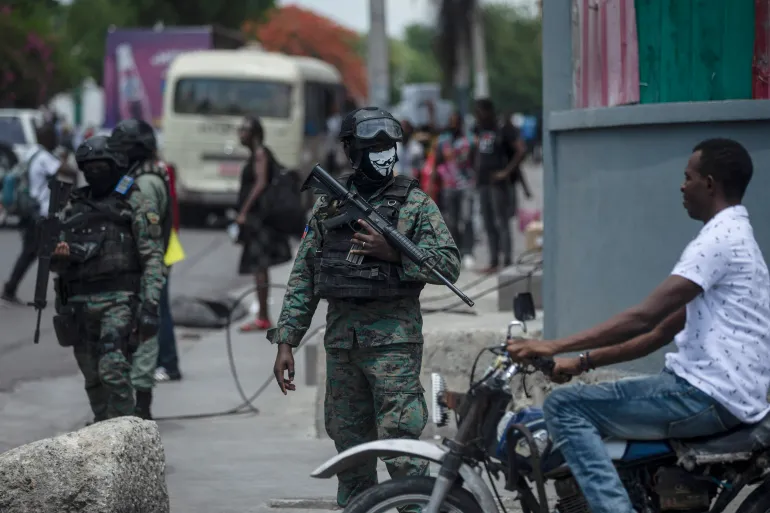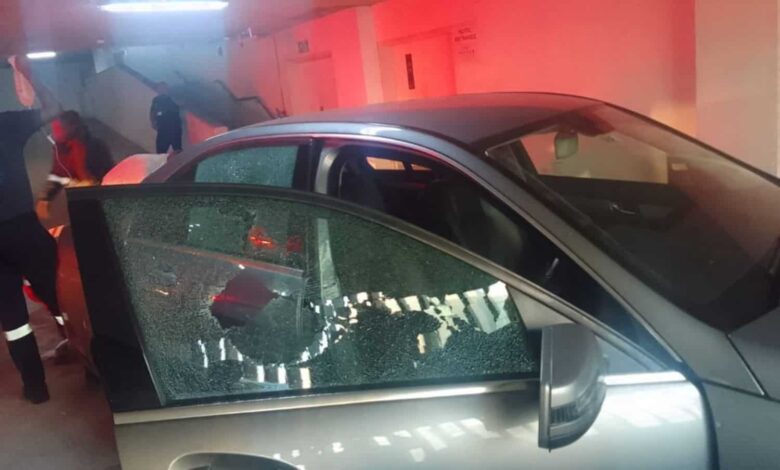Since the beginning of the month, criminal factions have launched highly coordinated attacks targeting the remaining institutions of the Haitian state— including the airport, police stations, government buildings, and the National Penitentiary.
This culmination of years of escalating gang influence and widespread public discontent has led to a joint offensive, compelling Prime Minister Ariel Henry to resign last week. Despite this significant concession, the move has failed to quell the unrest and restore order.
In Port-au-Prince, the gangs persist in strangling the city’s vital supply lines for food, fuel, and water. Despite their relentless grip, Haiti’s National Police, perhaps the last functional entity of the state, persist in their efforts, engaging in street-by-street battles to reclaim territory across the urban landscape. However, the vitality of the very city they are fighting to defend appears to be fading, eroded by the relentless urban warfare that undermines essential human connections.
The social fabric is unraveling as businesses and schools remain closed, leaving many residents isolated within their homes out of fear. Some have resorted to vigilantism in a desperate bid for security. Fear, distrust, and fury have become pervasive, with thoughts of death haunting the collective consciousness of the populace.
In the neighborhood of Canapé Vert in Port-au-Prince, the vibrant streets now bear witness to a once unthinkable measure to uphold order.
A stark reminder of extrajudicial actions, a swath of thick, irregular black soot adorning the pavement serves as the lasting imprint of numerous suspected criminals who met their end at the hands of residents. According to a local security source, their bodies were disposed of by fire, leaving behind only the remnants of their demise.
For years, gangs have plagued the inhabitants of Port-au-Prince, but their grip has tightened significantly in recent times, extending to cover an estimated 80% of the city, as reported by the United Nations. Faced with the encroaching menace, many Haitians in this area and beyond have banded together in a vigilante movement known as “bwa kale.”
This grassroots anti-gang movement has spurred the formation of neighborhood defense committees, equipped with shared fortifications, surveillance systems, checkpoints, and even patrols.
Their collective resolve yields results; in 2023, several residential areas in the city’s hilly terrain collaborated with local law enforcement to repel the Ti Makak gang, effectively driving them out of the region entirely. This success is corroborated by local sources and a February 2024 report from the Swiss-based Global Initiative Against Transnational Organized Crime.
However, the distinction between defense and mob justice can blur easily. Vigilante groups have been implicated in the lynching of hundreds of individuals suspected of gang affiliation or involvement in “common crimes,” as outlined in an October 2023 United Nations report.
In a conversation with CNN, conducted amidst a bustling parking lot adjacent to a church where a wedding ceremony unfolded within, a member of one militia shared their group’s efforts in thwarting repeated gang incursions into Canapé Vert.
“The gangs operate by seizing control of areas with significant businesses and extorting payments from them,” the militia member explained.
Notably, Canapé Vert boasts several prominent enterprises, including two national cellular companies and a major hotel. Speaking anonymously to CNN due to safety concerns, he elaborated further, “We constantly receive threats of attacks aimed at destroying our neighborhood. In response, we blockade the streets and conduct searches with the police; civilians are not involved in this process.” Armed solely with “machetes and our bare hands,” the militia maintains its defensive stance.
Conversely, law enforcement officials informed CNN that they are well-acquainted with the militia, even relying on their assistance. A police commander, speaking on condition of anonymity, credited the group with preventing a particularly fierce gang assault on the Canapé Vert police station the previous spring. During that incident, over a dozen suspected gang members were reportedly killed and incinerated outside the police station, according to the commander.
Meanwhile, just a short car ride away, another community struggles to maintain cohesion amidst even more dire circumstances: a displacement camp. These camps, scattered across the city, serve as refuge for tens of thousands of displaced city residents who have been driven from their homes due to violence and arson.
Marie Maurice, aged 56, recounted her harrowing experience of witnessing the encroachment of gangs into her neighborhood. When warned of an imminent gang attack on February 29, Maurice wasted no time, abandoning all her possessions and fleeing on foot with fellow residents to seek shelter at the public Argentine Bellegarde school.
Nearly three weeks later, amidst the makeshift settlement, children fly kites crafted from discarded foil and plastic, while others play with toy cars fashioned from empty soda cans, using bottle caps as wheels and stones as passengers.
Despite efforts to maintain a semblance of normalcy, the adults’ despair is palpable. They have appointed a leader to liaise with local law enforcement and advocate for aid from humanitarian organizations, yet little assistance has materialized due to city-wide roadblocks.
Maurice endeavors to keep her family’s small area within the cramped space clean, but resources are scarce. She must walk 20 minutes to purchase water for cleaning, and food is even scarcer. On some days, a single mint constitutes a meal, she lamented to CNN.
On the day of the interview, Maurice had not eaten at all.
In addition to the daily struggle for survival, numerous residents of the displacement camp express concerns over their strained relations with neighboring communities, indicating a worsening atmosphere. Tensions have escalated, resulting in clashes with locals who are eager for them to relocate, fearing that the influx of outsiders could draw unwanted attention from gangs.
With resources dwindling and violence escalating, the International Organization for Migration has repeatedly highlighted the emergence of a deepening “climate of mistrust” in Haiti. This environment threatens to unravel traditional social support structures, leaving individuals with nowhere to turn.
“Heightened levels of insecurity are fostering a sense of distrust between certain host communities and displaced populations, ultimately eroding social cohesion,” stated the organization in an August 2023 report. The report also observed a growing trend where displaced Haitians increasingly seek refuge in camps rather than relying on support from friends and family.
The small school where Maurice resides is already significantly overcrowded. Each day, more individuals arrive from various parts of the city, further stretching the limited resources available at the site. Residents reveal to CNN the dire conditions, including a full septic tank causing backed-up toilets and a nearly depleted water cistern.
Presently, a staggering 1,575 people are crammed into the open-air classrooms—a mere fraction of the over 360,000 individuals displaced nationwide, as reported by the International Organization for Migration (IOM).
Amidst this chaos, fear reigns supreme in Port-au-Prince. The city has long endured the terror of frequent kidnappings, torture, and sexual assault perpetrated by gangs. Yet, amidst ongoing deliberations among Haiti’s ruling elite regarding the composition of a presidential transitional council, and with the international community reluctant to intervene, discussions of a political resolution seem increasingly futile. As gunshots continue to echo through the evenings, shattering the city’s uneasy silence, the prospect of peace feels more elusive than ever.
Meanwhile, the proliferation of police, gang, and civilian checkpoints is further splintering Haiti’s capital into apprehensive and vigilant territories. With each passing day, it seems that the only thing binding the populace together is shared trauma.
Marie-Suze Saint Charles, aged 47, bears witness to this pervasive fear firsthand. Her own sons, gripped by terror in the face of ceaseless violence, are too afraid to even visit her in the hospital. Saint Charles recounts her ordeal—she was shot on March 1, her leg shattered, as she made her way home from work.
One of her sons, aged 17, also fell victim to gunfire and lies wounded in a different hospital. Meanwhile, her other sons, aged eight and thirteen, refuse to venture outside, preferring the perceived safety of their home. Saint Charles is uncertain about their well-being, unsure if anyone is providing them with food.
“They are afraid of the streets,” she shares from her hospital bed with CNN. “They won’t even come to see me. The fear keeps them indoors.”
Source: https://edition.cnn.com/2024/03/18/world/haiti-crisis-militias-battle-intl-latam/index.html
Image Source: https://www.aljazeera.com/news/2022/7/13/thousands-trapped-as-gangs-battle-for-control-in-port-au-prince






